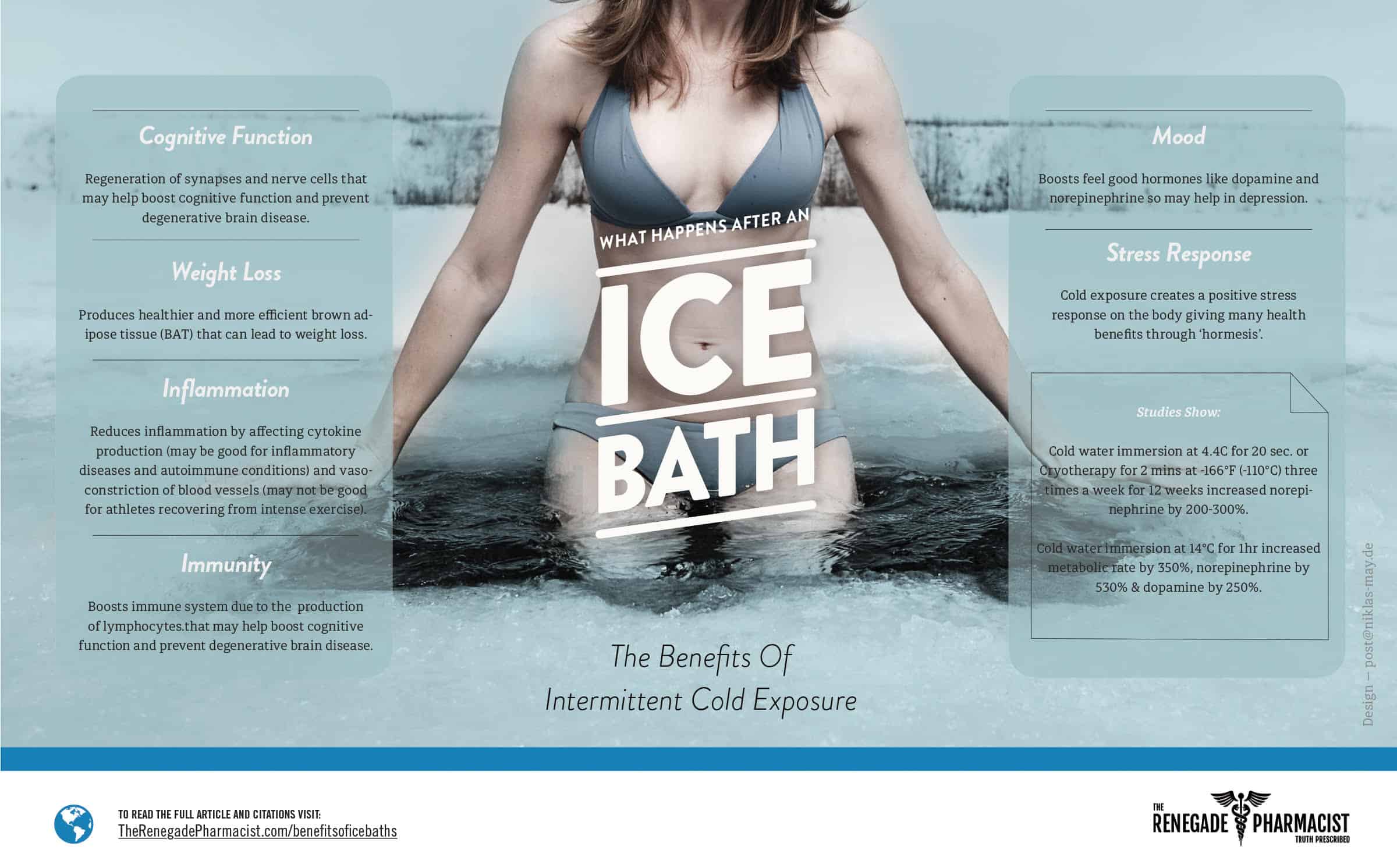In this article, you will discover the amazing intermittent cold exposure and ice bath benefits.
I was drawn to the sauna as a way to destress from my job as a community pharmacist and would always follow it with a dip inside the cold plunge pool. For me, it was just a way to quickly cool down before hitting the sauna again.
However several years later I realized the potential benefits of cold exposure after spending time with Wim Hof and studying his Wim Hof Method, who is famous for his ability to withstand extreme temperatures. His world record for cold exposure is over 2hrs encased in ice!
Cold therapy has also been around for thousands of years. Its benefits could explain the reason why the Himalayan yogis and Tibetan monks retreated high up in the mountains to meditate in the snow and ice-cold lakes.
In India, people would call therapeutic cold showers “Ishnaan”. It literally means the point at which the body adapts to the coldness by raising its own internal temperature.
How An Ice Baths Works On The Body
This happens when blood vessels open with cold exposure, then close again during the course of the cold shower. This causes blood to rush back and flush the organs and glands. This helps remove toxins and improve blood circulation to the organs.
With longer cold exposure the ice bath benefits you by setting of cytokine release.
Cytokines are important for intercellular communication, aiding the development of cells, repairing tissues and controlling immunity.
Prolonged cold exposure can also trigger the release of endorphins that are similar to opiates and are your bodies natural pain-killers. Low levels of endorphins are also associated with autoimmune disease and stress-related chronic disease. They are also responsible for our feelings of pleasure, that occur after any kind of intense workout, as well as having sex.
Research at the Department of Radiation Oncology at Virginia Commonwealth University School of Medicine indicates that short cold showers may stimulate the brain’s “blue spot” the brain’s primary source of noradrenaline, a chemical that could help mitigate depression.
Understanding the process of hormesis
Just like the sauna many of the benefits of cold exposure come from ‘hormesis’, the hormonal changes that occur after a short period of positive stress on the body.
Cold therapy using cold showers or ice baths, tricks your body, switching on your survival mode.
Cold exposure releases cold shock proteins such as RNA binding motif 3 (RBM3) that is linked to the regeneration of synapses.
You begin to produce health-promoting brown fat and become a super-efficient fat-burning machine. This improves metabolic efficiency, boosting vital health markers, increasing your growth hormone, lowering inflammation, releasing endorphins and happy hormones like dopamine.
This may explain why the Himalayan Sherpas who live in extreme cold conditions and why athletes like Lance Armstrong and Michael Phelps use cold therapy to create superhuman strength and endurance.
Pickkers a dutch scientist studying Wim Hof discovered that Wim Hof’s cold therapy using a combination of cold exposure, breathing techniques, and mental concentration techniques showed significantly lower levels of inflammatory proteins when compared to using just the concentration technique alone, showing cold exposure is essential for its anti-inflammatory benefits.
Results also showed a reduction in cytokine production by white blood cells after just 6 days. Cytokines are involved in the regulation of the inflammatory response and high levels are associated with diseases of inflammation like arthritis, colitis and Crohn’s.
Cold therapy was also a part of the treatment protocol for depression in the fantastic TV series, The Doctor Who Gave Up Drugs featuring Dr Chris van Tulleken. He recommended swimming in a cold water lake in preference to the usual medication a patient called Sarah was taking for chronic depression. The results were astonishing with Sarah completely coming off her medication.
Ice Bath Benefits And The Science Behind It
Dr. Rhonda Patrick, a highly respected scientific journal, who I was fortunate to meet while staying at Wim Hof’s retreat in Holland, has given a great scientific breakdown of what happens to your body after an ice bath.
An ice bath benefits you in quite a lot of ways that positively impact your body. We’ve listed an extensive list below.
Some ice bath benefits include:
-
Cognitive function
Regeneration of synapses and nerve cells that may help boost cognitive function and prevent degenerative brain disease.
-
Weight loss
Produces healthier and more efficient brown adipose tissue (BAT) that can lead to weight loss.
-
Inflammation
Reduces inflammation by affecting cytokine production (maybe good for inflammatory diseases and autoimmune conditions) and vasoconstriction of blood vessels (may not be good for athletes recovering from intense exercise)
-
Immunity
Boosts immune system due to the production of lymphocytes.
-
Mood
Other Aditional benefits of ice baths with the science breakdown:
- Boosts feel-good hormones like dopamine and norepinephrine so may help in depression.
- Exposure to cold releases norepinephrine into the brain, where it is involved in vigilance, focus, attention, and mood.
- Norepinephrine reduces inflammation through the inhibition of inflammatory cytokines including TNF-alpha (tumor necrosis factor-alpha), a molecule involved in almost every human disease from type 2 diabetes to cancer.
- Inflammatory cytokines are linked to anxiety and depression and the cold may help reduce inflammation as well as alleviate the symptoms of depression.
- Cold thermogenesis, stimulated by cold exposure is a way for the body to produce heat. The health benefits are due to the activation of brown adipose tissue (BAT), a type of fat that burns regular white fat for heat generation.
- You result in more mitochondria producing ATP, via mitochondrial biogenesis, the currency of energy in the body. The more BAT you have, the better your body becomes in burning fat for energy. This means cold therapy could be beneficial for losing unhealthy weight.
- Cold exposure also releases cold shock proteins such as RNA binding motif 3 (RBM3) that is linked to the regeneration of synapses. Similar effects have been observed in so-called heat shock proteins that are released under heat stress.
- Norepinephrine reduces inflammation through the inhibition of inflammatory cytokines including TNF-alpha (tumor necrosis factor-alpha), a molecule involved in almost every human disease from type 2 diabetes to cancer.
- Inflammatory cytokines also play a role in anxiety and depression, therefore cold exposure may have mood-enhancing capabilities.
How Cold Should You Go?
— Dr. Rhonda Patrick Ph.D., Biomedical Science – Expert in fields of Aging, Cancer & Nutrition
Cryotherapy (usually between −100°C and −140°C for 2-5 minutes)
An abstract from In a scientific journal on “whole-body cryotherapy”;
When looking at the research it appears the benefits of cryo are pretty much the same as any other intermittent cold exposure method, however you just need a much shorter duration.
It is obviously a very expensive and potentially dangerous way to get the benefits of cold exposure compared to the other methods that exist, and not many cryo-centers exist yet so it makes this inaccessible to most people.
Wim Hof also states that cryo is not natural and having an ice bath is way better and safer.
Ice baths or cold water immersion (4.4C for 20 seconds)
This produced similar levels of norepinephrine as cryo.
It may be that prolonged exposure at a safer temperature may produce more beneficial effects.
Cold immersion at 14C
Studies on “human physiological responses to immersion into water of different temperatures show that:
One hr, head out, Coldwater immersion at 14°C increased metabolic rate by 350%, norepinephrine by 530% & dopamine by 250%
This results in far greater production of norepinephrine compared to cryo and cold water at 4.4C, however, it takes a longer time.
Perhaps the sweet spot would be lower temperatures of 2-14C but for a prolonged time, i.e as long as you can handle it. There does not seem to be any studies as yet to confirm this.
Maybe the ancient Indian yogis had it just right with Ishnan all along?
Does Cold Exposure Improve Athletic Performance?
British number one tennis player, Andy Murray and Olympic champion Jessica Ennis-Hill both use ice baths as a way to boost their recovery after training.
“But is this really a good idea for athletes?”
Ice is a common aid to lower inflammation after an injury. It can also help numb the pain.
However, in athletes who use it to ease inflammation after intensive work-outs, may prevent proper growth and repair of their muscles.
Cold exposure is anti-inflammatory but a little inflammation may be a good thing when attempting to regrow stronger and bigger muscles.
Cold also causes vasoconstriction that restricts blood flow to muscles and so this may also affect the regeneration of muscles after exercise.
In a study, where people did a three-month course of ice baths while strength training but when they took ice baths, they made smaller gains in muscle mass and strength.
The Renegade Pharmacist’s Verdict
I have become a great fan of cold showers and cold water plunge pools considering I used to absolutely hate the cold when I was younger.
This hatred may have been triggered by a school teacher forcing us to swim in a freezing open-air swimming pool, however little did I know at the time that this could have been very beneficial.
I have to say, I feel absolutely amazing after my sauna/cold pool sessions that I do regularly.
My current record time in an ice bath at around 5-7C is 31 minutes. I am sure I could easily do 1hr at 14C, but I feel that is a pretty time-consuming task. I would love to see the benefits of 10-15 minutes at 5-7C, as this is the time I usually do when I rotate this with the sauna.
I the words of Wim Hof, ‘Cold is my new best friend’.
Not many people know this but I also produced the music for the Wim Hof Method…
Learn the Wim Hof Method and download the music from Wim’s website here.
References
Dr Rhonda Patrick and her work on cold exposure.
The Surprising Health Benefits of Extreme Hot and Cold Temperatures

Designed by Niklas May contact: [email protected]




Very nice and thank you for all the helpful information. I am doing icebaths sind over 2 years and I can’t be without the anymore – my body just loves it. Thank you for the article
That’s it I’m buying a chest freezer! I met Wim in August ‘16 at a 4 day retreat. I suffer from MS and always feel great after the ice. The logistics of getting ice and a new house has a tiny bath has prevented from having ice baths. I’m taking the plunge;) and buying a chest freezer to have regular ice baths with ease. Love to keep u up to date with progress.